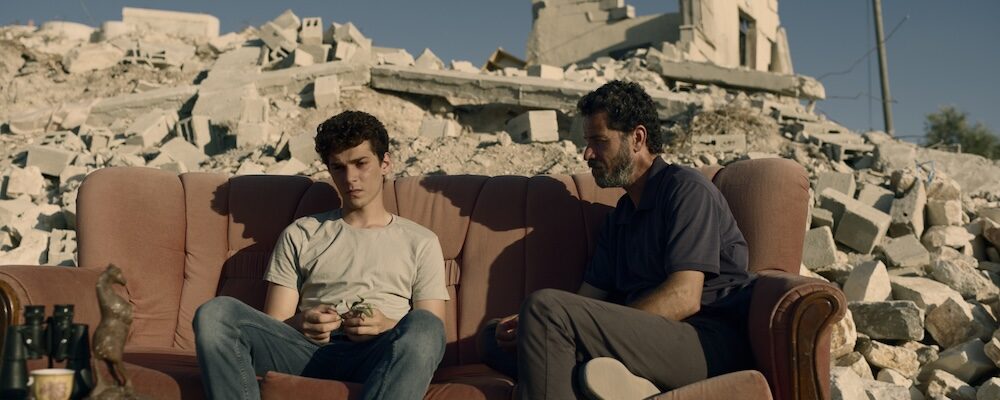‘The Teacher’ Compels as a Portrait of an Occupied Palestine Told Through an Educator’s Trials
Alci Rengifo
Cinema remains the most powerful, universal tool for oppressed peoples to get their stories out. The moving image strikes more immediately than the printed word in our electronic age, even if both mediums have a lasting importance. Farah Nabulsi’s “The Teacher” is both a riveting, intimate drama that can stand on its own and a defiant statement against the ongoing oppression of the Palestinian people. It’s not about the trigger terminology common in media like “terrorism” or “Middle East conflict.” Nabulsi’s film is about the people enduring an occupation that seeps into every facet of daily life. Her approach is fair and gives voice to some on the other side of the situation, hoping that semblances of humanity can somehow overcome the madness of tribalism.
The teacher of the title is Basem (Saleh Bakri) an English teacher in the village of Burin located in the West Bank, one of the Palestinian territories occupied by Israel and its encroaching settlers. Like many educators, he can’t help but grow close to certain pupils, especially when your community collectively faces oppression. A former student, Yacoub (Mahmoud Bakri), has just returned home after serving two years in an Israeli prison for protesting. Yacoub’s younger brother, Adam (Muhammad Abed Elrahman) is now Basem’s student with much promise. Lisa (Imogen Poots) is a British volunteer who has arrived in the West Bank to work as a counselor. For her it’s a near-revelation to see just how the occupation operates with its apartheid roads and unequal justice system when it comes to Jews and Arabs. Tragedy soon strikes, leaving Basem to become an almost mentor for an enraged Adam. Meanwhile, a Jewish-American couple, Simon (Stanley Townsend) and Rachel (Andrea Irvine), work with the Israeli government to find their son, an Israeli soldier who has been abducted by Palestinian rebels.
This is Farah Nabulsi’s feature directorial debut after the success of her 2020 short, “The Present,” which was nominated for the Best Live Action Short Film Oscar. It powerfully captured Palestinian reality in 23 riveting minutes featuring Bakri as a father trying to simply get a new appliance home with his daughter, while facing Israeli soldiers at a checkpoint. Now able to tell a lengthier story, Nabulsi’s screenplay for “The Teacher” is potent even if at times slightly crammed, but one feels the urgency of a filmmaker who wants to communicate so much that is important. Like the political thrillers of Costa-Gavras, she finds the personal angle behind the headlines. For these characters, the Israeli occupation affects every pore of their existence. Yacoub, more muscle in comparison to brainier brother Adam, went to prison for the mere offense of protesting, which is common in the occupied territories where Israel has notoriously arrested countless children. Basem is a good teacher, committed and honest, yet even he harbors secrets related to the underground resistance. There are few logical choices when racist Israeli settlers arrive to burn the Palestinians’ olive trees with no fear of murdering someone, since the courts will not convict them. This is the reality captured so starkly in the recent Oscar-winning documentary “No Other Land.” One of its Palestinian directors was recently nearly lynched by settlers.
Nabulsi’s stances are strong and clear, yet she does find challenging, layered complexities for the narrative. Her dialogue tries to give voice to debates and issues swirling around this conflict. Simon, the grieving father from the U.S., tries to reason with Basem that he is indeed Jewish but that doesn’t mean he automatically agrees with Israeli policy. He warned his son not to migrate to a country he barely knew. It’s a subtle connection to what we have seen so often now of Jewish students and protesters marching against the ongoing, horrific war on Gaza by an ethnonationalist regime they can barely, if ever, relate to. Among the Palestinians, there is also the intense debate over how to resist. Basem does not openly advocate for armed attacks, even if he may approve of using a kidnapped soldier as a bargaining chip to secure the release of Palestinian political prisoners. Saleh Bakri captures tension and conflicting dimensions with great empathy and focused anger. Hopefully this film gives a magnificent talent more exposure.
Even when Nabulsi uses classic storytelling devices, like the potential for romance between the teacher and Lisa, the convenient outsider who just so happens to be a fan of poetry as well (which is a good way to introduce audiences to the great Palestinian poet Mahmoud Darwish), the film thrives on its urgency. Cinema is becoming the most powerful tool for Palestinians to bring the world into their story. One can’t help but truly care for these characters because the stakes are so high. It is their very existence on the line every time a protest turns into a bloodbath or the Israeli army knocks at the door. Paul Herzberg is memorable as Liberman, the Israeli official in charge of tracking down the kidnapped soldier, who coldly smirks when Basem reminds him he is indigenous while Liberman migrated from Romania. At the heart of the Israel-Palestine conflict is a panorama of universal issues relating to the nature of nationalism, ethnicity, coexistence and identity. Even with its rougher edges, “The Teacher” encompasses it all in its characters, as another worthy drama of a terrible conflict still playing itself out with no end in sight.
“The Teacher” releases April 11 in select theaters.

